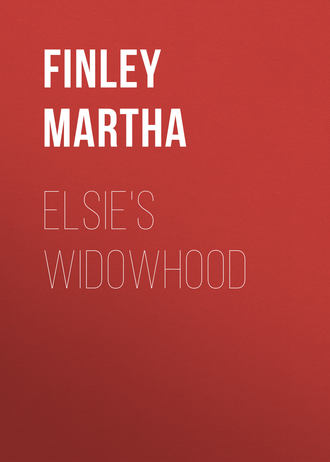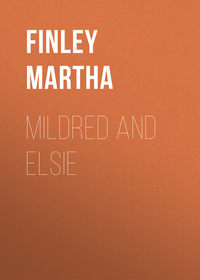 полная версия
полная версияElsie's Widowhood
"Mother," he said, taking her hand in his, "I will heed your counsels, but it seems to me that having seen Christianity so beautifully exemplified in your life and my father's, I can never doubt its truth and power."
Then after a pause in which tears of mingled joy and sorrow fell freely from her eyes, "Dear mother, you have given me a very liberal allowance. Can you spare it? I do not know, I have never known the amount of your income."
"I can spare it perfectly well, my son," she answered, with a tender smile, pleased at this proof of his thoughtful love. "It is the sum your father thought best to give you – for we had consulted together about all these matters. I do not wish you to feel stinted, but at the same time would have you avoid waste and extravagance, remembering that they are inconsistent with our Saviour's teachings, and that money is one of the talents for whose use or abuse we must render an account at the last."
CHAPTER VII
"But O! for the touch of a vanished hand,And the sound of a voice that is still."– Tennyson.It was a chill November day, a day of lowering clouds, wind, rain, sleet and snow.
Arthur Conly coming into the drawing-room at Ion and finding its mistress there alone, remarked as he shook hands with her, "The beginning of winter, Cousin Elsie! It is setting in early. It froze hard last night, and the wind to-day is cutting."
"Yes," she said, "even papa and my two big, hardy boys found a short walk quite sufficient to satisfy them to-day. But you poor doctors can seldom consult your own comfort in regard to facing wind and storm. Take this easy chair beside the fire."
"Thank you, no; I shall find it quite warm enough on the sofa beside you. I am glad to have found you alone, for I want to have a little semi-confidential chat."
She gave him an inquiring look.
"I am a little uneasy about grandpa," he went on: "he seems feeble and has a troublesome cough, and I think should have a warmer climate through the coming winter. I think too, cousin, that such a change would be by no means hurtful to you or your children," he continued, regarding her with a grave, professional air: "you are a trifle thin and pale, and need something to rouse and stimulate you."
"What is it you wish, Arthur?" she asked, with a slight tremble in her voice.
"I should be glad if you would go to Viamede for the winter and take our grandfather with you."
He paused for an answer.
Her face was turned toward a window looking out upon the grounds; her eyes rested with mournful gaze upon a low mound of earth within a little enclosure not many rods away.
Arthur read her thoughts, and laying a gentle hand on hers, said in low compassionate tones:
"He is not there, cousin, and his spirit will be as near you in your Lily's birthplace, and your own, as here. Is not that home also full of pleasant memories of him?"
She gave a silent assent.
"And you can take all your other dear ones with you."
"Except Edward."
"Yes, but in his case it will only involve a little delay in receiving letters. Your father and Aunt Rose I am certain will go with you. And our old grandpa – "
"Is a dear old grandpa, and must not suffer anything I can save him from," she interrupted. "Yes, Arthur, I will go, if – if my father approves and will accompany us, of which I have no doubt."
He thanked her warmly. "It may be the saving of grandpa's life," he said.
"He is getting very old, Arthur."
"Yes, past eighty, but with care he may live to be a hundred; he has a naturally vigorous constitution. And how he mellows with age, Elsie! He has become a very lovely Christian, as humble and simple-hearted as a little child."
"Yes," she said turning toward him eyes filled with glad tears, "and he has become very dear to me. I think he loves us all – especially papa – and that we shall have a happy winter together."
"I don't doubt it; in fact, I quite envy you the prospect."
"Oh could you not go with us to stay at least a few weeks? We should all be so very glad to have you."
"Quite impossible," he said, shaking his head rather ruefully. "I'm greatly obliged, and should be delighted to accept your invitation, but it isn't often a busy doctor can venture to take such a holiday."
"I'm very sorry. But you think there is no doubt that grandpa will be willing to go?"
"He'll not hesitate a moment if he hears Uncle Horace is to go. He clings to him now more than to any other earthly creature."
"Papa is in the library; shall we join him and hear what he thinks of your plan?" said Elsie, rising.
"By all means," returned Arthur, and they did so.
Mr. Dinsmore highly approved, as did Rose also on being called in to the conference.
"How soon do you think of starting?" she asked, looking at Elsie, then at her husband.
"Papa should decide that," Elsie answered, a slight tremble in her voice, thinking of the absent one to whom that question should have been referred were his dear presence still with them.
She caught a look of tenderest love and sympathy from her father. How well he understood her! How ever thoughtful of her feelings he was!
"I think the decision should rest with you, daughter," he said; "though I suppose the sooner the better."
"Yes," said Arthur; "for grandpa especially."
"I presume no great amount of preparation will be needful, since it is but a change from one home to another," suggested Rose.
"No," said Elsie, "and I think a week will suffice for mine. Papa, can business matters be arranged in that time?"
"Oh yes! so we will say this day week."
The door had opened very quietly a few moments before, admitting little Rose and Walter, and stealing softly to their mother's side they were now leaning on her lap, looking from one to another of their elders and listening with some curiosity to their conversation.
"What is it, mamma?" asked Rosie.
"We are talking of going to Viamede, dear."
"Oh that will be nice!"
"But we tan't doe wis-out papa," prattled Walter; "tan we, mamma? I wish my dear papa tum back quick."
Rosie saw the pain in mamma's dear face, the tears in her eyes as she pressed a silent kiss on the brow of the innocent questioner, and with ready, loving tact she seized the little fellow's hand, and, drawing him away, "Come, Walter," she said, "let us go and tell the rest about it."
They ran away together, and Arthur rose to take leave.
"Am I imposing upon your unselfish kindness of heart, my dear cousin?" he asked in an undertone, taking Elsie's hand in his; "is it too great a sacrifice of your own feelings and inclinations?"
She answered with a text, as was not unusual with her, "'Even Christ pleased not himself.'"
Mr. and Mrs. Dinsmore were conversing apart at the moment.
"Perhaps," returned Arthur musingly, "we might make some other arrangement; grandpa might be willing to go without – "
"No, no," she interrupted, "I could not think of giving him the pain of separation from papa, nor could I bear that myself. But do not trouble about me; there will be much pleasure mingled with the pain – pleasure in ministering to the comfort and happiness of the dear old grandpa, and in seeing Viamede and the old servants. I have always loved both the place and them."
Her father had caught a part of her words.
"Separation from me?" he said, turning toward her, "who talks of that? It shall not be with my consent."
"No, papa, nor with mine, for either grandpa or myself," she said with a look of affection and a slight smile. "Arthur, will you carry a message from me to Isa?"
"With pleasure."
"Then tell her I should be very glad to have her spend the winter at Viamede with us, if she feels that she would enjoy the trip and the quiet life we shall lead there. There will, of course, be no gayeties to tempt a young girl."
"Thank you," he said, his eyes shining; "I have not the slightest doubt that she will be delighted to accept the invitation. And, now I think of it, Aunt Enna and Molly will of course find a home with us at Roselands while you are away."
"No, no, they will go with us," returned Elsie quickly, "unless indeed they prefer to be left behind."
Arthur suggested that they would be a great charge, especially upon the journey, but the objection was promptly overruled by Mr. Dinsmore, Rose and Elsie.
Molly must go, they all said; she would be sure to enjoy the change greatly: and the poor child had so few pleasures; and the same was true of Enna also: she had never seen Viamede, and could not fail to be delighted with its loveliness; nor would it do to part her from Molly, who was now her chief happiness.
"I trust they will appreciate your kindness; Molly will, I am sure," Arthur said as he went away.
As the door closed on him, Elsie glided to the window and stood in a pensive attitude gazing out upon that lowly mound, only faintly discernible now in the gathering darkness, for night was closing in early by reason of the heavy clouds that obscured the sky.
A yearning importunate cry was going up from her almost breaking heart. "My husband, oh my husband, how can I live without you! Oh to hear once more the sound of your voice, to feel once again the clasp of your arm, the touch of your hand!"
A sense of utter loneliness was upon her.
But in another moment she felt herself enfolded in a strong yet tender embrace, a gentle caressing hand smoothing her hair.
"My darling, my precious one, my own beloved child!" murmured her father's voice in its most endearing accents, as he drew her head to a resting place on his breast.
She let it lie there, her tears falling fast.
"I fear this going away is to be too great a trial to you," he said.
"No, papa, but I am very weak. Forgive my selfish indulgence of my sorrow."
"My darling, I can sympathize in it, at least to some extent. I remember even yet the anguish of the first months of my mourning for your mother."
"Papa, I feel that my wound can never heal; it is too deep; deep as the roots of my love for him, that had been striking farther and farther into the soil with every one of the many days and years that we lived and loved together."
"I fear it may be so," he answered with tenderest compassion; "yet time will dull the edge of your sorrow; you will learn to dwell less upon the pain of the separation, and more upon his present happiness and the bliss of the reunion that will be drawing nearer and nearer with each revolving day. Dear one, this aching pain will not last forever; as Rutherford says, 'Sorrow and the saints are not married together; or suppose it were so, Heaven would make a divorce.'"
"They are very sweet words," she murmured, "and sweeter still is the assurance given us in the Scriptures that 'our light affliction, which is but for a moment, worketh for us a far more exceeding and eternal weight of glory.'"
"Yes," said Rose, coming to her other side and speaking in low, tender tones, "dear Elsie, let those words comfort you; and these others also, 'Whom the Lord loveth he chasteneth, and scourgeth every son whom he receiveth.' But for that and similar texts I should wonder much that trial of any kind was ever permitted to come nigh one who has been a loving disciple of Jesus since her very early years."
"Was it that I loved my husband too well?" Elsie queried in tremulous tones. "I do not think I made an idol of him; for inexpressibly dear as he was, the Master was dearer still."
"If that be so you did not love him – your husband – too well," her father answered.
"I hear my children's voices; I must not let them see their mother giving way to grief like this," she said, lifting her head and wiping away her tears.
They came in – the whole six – preceded by a servant bearing lights.
There was a subdued eagerness about the younger ones, as they hastened to their mother asking, "Mamma, is it really so – that we are going to Viamede?"
"Yes, dears, I believe it is quite settled. Grandpa approves, and I hope you are all pleased."
"Oh yes, yes!"
"If you are, mamma," the older girls said, noticing with affectionate concern the traces of tears on her face; "if not, we prefer to stay here."
"Thank you, my darlings," she answered, smiling affectionately upon them; "for several reasons I shall be glad to go, the principal being that our poor old grandfather needs the warm climate he will find there; and of course we could not think of letting him go alone."
"Oh no!" they said; "he could not do without grandpa, and neither could we."
"And neither could grandpa do without his eldest daughter, or her children," added Mr. Dinsmore playfully, sitting down and taking Walter upon one knee, Rosie upon the other. "So we will all go together, and I trust will have a happy time in that lovely land of fruits and flowers."
They had not seen it for several years, not since Walter was a babe and Rosie so young that she remembered but little about it. Both were delighted with the prospect before them, and plied their grandpa with many eager questions, while their mother looked on with growing cheerfulness, resolutely putting aside her grief that she might not mar their pleasure.
The other four had gathered about her, Vi on a cushion at her feet, Elsie seated close on one side, Herbert standing on the other, and Harold at the back of her chair, leaning fondly over her, now touching his lips to her cheek, now softly smoothing her shining hair.
"Dear mamma, how beautiful you are!" he whispered.
"You might as well say it out loud," remarked Herbert, overhearing the words, "because everybody knows it and nobody would want to contradict you."
"We are very apt to think those beautiful whom we love," their mother said with a pleased smile, "and the love of my children is very sweet to me."
"Yes, mamma, but you are beautiful," insisted Harold; "it isn't only my love that makes you look so to me, though I do love you dearly – dearly."
"Mamma knows we all do," said Violet; "we should be monsters of ingratitude if we did not."
"As I should be if I were not filled with thankfulness to God that he has blessed me with such dutiful and affectionate children," added the mother.
"Mamma, how soon will we go to Viamede?" asked Violet; and that question being answered, another quickly followed. "We will not leave Molly behind?"
"No, certainly not; nor Aunt Enna, if they will kindly consent to go with us."
"Consent, mamma! I'm sure they cannot help being delighted to go. May I run and tell them?"
"Yes, my child; I know you always enjoy being the bearer of pleasant news."
Molly heard it with great pleasure and gratitude to her cousin; Enna with even childish delight. Neither had a thought of declining.
Isadore Conly, also, was very much pleased, and sure she should vastly enjoy the winter with her relations, spite of many an envious prognostication to the contrary on the part of her mother and Virginia. They would not go on any account, they averred, and were glad they had been overlooked in the invitation – mean as it was in Elsie not to include them – for life at Viamede could not fail to be a very dull affair for that winter at least.
But Elsie, of course, heard none of these unkind remarks, and seeing the happiness she was conferring not only upon more distant relations but upon her children also, who showed increasing pleasure in the thought of the expected visit to their lovely southern home as the time drew near, she felt fully repaid for the sacrifice of feeling she was making.
CHAPTER VIII
"'Tis easier for the generous to forgiveThan for offence to ask it."– Thomson.The only noteworthy incident of the journey of our friends took place at New Orleans, where they halted for a few days of rest to all, and sight-seeing on the part of the young people.
Mr. Horace Dinsmore, who had some business matters to attend to in connection with Elsie's property in the city, was hurrying back to his hotel one afternoon, when a beggar accosted him, asking for a little help, holding out a very forlorn hat to receive it.
There seemed something familiar in the voice, and Mr. Dinsmore stopped and looked earnestly at its owner.
A seamed, scarred face, thin, cadaverous, framed in with unkempt hair and scraggy beard – an attenuated form clothed in rags – these were what met his view, surely for the first time, for there was nothing familiar about either.
No, not for the first time; for, with a start of recognition and a muttered curse, the mendicant dropped his hat, then stooped, hastily snatched it from the ground, and rushed away down an alley.
"Ah, I know you now!" cried Mr. Dinsmore, giving instant pursuit.
He could not be mistaken in the peculiarly maimed hand stretched out to regain the hat.
Its owner fled as if for his life, but, weak from disease and famine, could not distance his pursuer.
At last, finding the latter close at his heels, he stopped and faced him, leaning, panting and trembling, against a wall.
"George Boyd, is it you? reduced to such a condition as this!" exclaimed Mr. Dinsmore, eying him searchingly.
"You've mistaken your man, sir," panted the fugitive. "My name's Brown – Sam Brown at your service."
"Then why did you run away from me?" coolly inquired the gentleman. "No, I cannot mistake that hand," pointing to the maimed member.
"And you'd like to hang me, I suppose," returned the other bitterly. "But I don't believe you could do it here. Beside, what's the use? I'll not cumber the ground much longer, can't you see that? Travilla himself," he added, with a fierce oath, "can hardly wish me anything worse than I've come to. I'm literally starving – can hardly get enough food to keep soul and body together from one day to another."
"Then come with me and I will feed you," Mr. Dinsmore said, his whole soul moved with pity for the miserable wretch. "Yonder is a restaurant; let us go there, and I will pay for all you can eat."
"You don't mean it?" cried Boyd in incredulous surprise.
"I do; every word of it. Will you come?"
"A strange question to ask a starving man. Of course I will; only too gladly."
They crossed the street, entered the eating-house, and Mr. Dinsmore ordered a substantial meal set before Boyd. He devoured it with wolfish voracity, his entertainer watching him for a moment, then turning away in pained disgust.
Time after time plate and cup were filled and emptied, but at last he declared his appetite fully satisfied. Mr. Dinsmore paid the reckoning, and they passed out into the street together.
"Well, sir," said Boyd, "I'm a thousand times obliged. Shall be more so if you will accommodate me with a small loan – or gift if you like, for I haven't a cent in the world."
"How much do you think you deserve at my hands?" asked Mr. Dinsmore somewhat severely, for the request seemed to him a bold one under the circumstances.
"I leave that to your generosity, sir," was the cool reply.
"Which you expect to be great enough to allow you to escape the justice that should have been meted out to you years ago?"
"I've never harmed a hair of your head nor of any one belonging to you; though I owe a heavy scare to both you and Travilla," was the insolent rejoinder.
"No, your imprisonment was the due reward of your lawless and cruel deeds."
"Whatever I may have done," retorted the wretch with savage ferocity, "it was nothing compared to the injury inflicted upon me. I suffered inconceivable torture. Look at me and judge if I do not speak the truth; look at these fearful scars, these almost blinded eyes." He finished with a torrent of oaths and curses directed at Travilla.
"Stop!" said Mr. Dinsmore authoritatively, "you are speaking against the sainted dead, and he entirely innocent of the cause of your sufferings."
"What! is he dead? When? where? how did he die?"
"At Ion, scarce two months ago, calmly, peacefully, trusting with undoubting faith in the atoning blood of Christ."
Boyd stood leaning against the outer wall of the restaurant; he was evidently very weak; he seemed awe-struck, and did not speak again for a moment; then, "I did not know it," he said in a subdued tone. "So he's gone! And his wife? She was very fond of him."
"She was indeed. She is in this city with her family, on her way to Viamede."
"I'm sorry for her; never had any grudge against her," said Boyd. "And my aunt?"
"Is still living and in good health, but beginning to feel the infirmities of age. She has long mourned for you as worse than dead. You look ill able to stand; let me help you to your home."
"Home? I have none." There was a mixture of scorn and despair in the tones.
"But you must have some lodging place?"
"Yes, sometimes it is a door-step, sometimes a pile of rotten straw in a filthy cellar. On second thoughts, Dinsmore, I rather wish you'd have me arrested and lodged in jail," he added with a bitter laugh. "I'd at least have a bed to lay my weary limbs upon, and something to eat. And before the trial was over I'd be beyond the reach of any heavier penalty."
"Of human law," added Mr. Dinsmore significantly, "but do not forget that after death comes the judgment. No, Boyd; I feel no resentment toward you, and since your future career in this world is evidently very short, I do not feel called upon to deliver you up to human justice. Also, for your aunt's sake especially, I am inclined to give you some assistance. I will therefore give you the means to pay for a decent lodging to-night, and to-morrow will see what further can be done, if you will let me know where to find you."
Time and place were fixed upon, money enough to pay for bed and breakfast was given to Boyd, and they parted company, Mr. Dinsmore hastening on his way to his hotel – the very best the city afforded – with a light, free step, while Boyd slowly dragged himself to a very humble lodging in a narrow, dirty street near at hand.
Mr. Dinsmore found his whole party gathered in their private parlor and anxiously awaiting his coming. As he entered there was a general exclamation of relief and pleasure on the part of the ladies and his father, and a joyous shout from Rosie and Walter as each hastened to claim a seat upon his knee.
"My dears, grandpa is tired," said their mother.
"Not too tired for this," he said, caressing them with all a father's fondness.
"Are you not late, my dear?" asked his wife; "we were beginning to feel a trifle anxious about you."
"Rather, I believe. I will explain the cause at another time," he said pleasantly.
Tea was brought in, family worship followed the meal, and shortly after that Elsie retired with her little ones to see them to bed; the others drew round the table, each with book or work, Harold pushing Molly's chair up near the light; and Mr. Dinsmore, seating himself beside his wife, on a distant sofa, gave her in subdued tones an account of his interview with Boyd.
"Poor wretch!" she sighed, "what can we do for him? It is too dreadful to think of his dying as he has lived."
"It is, indeed! We will consult with Elsie as to what can be done."
"The very mention of his name must be a pain to her; can she not be spared it?"
"I will consider that question. You know I would not willingly pain her," he said, with a tenderly affectionate glance at his daughter as she re-entered the room; then rising he paced the floor, as was his habit when engaged in deep or perplexing thought.
Elsie watched him a little anxiously, but without remark until all the others had retired, leaving her alone with him and Rose.
Then going to him where he sat, in a large easy chair beside the table, looking over the evening paper, "Papa," she said, laying her hand affectionately on his arm, "I fear you are finding my affairs troublesome."
"No, my dear child, not at all," he answered, throwing down the paper and drawing her to a seat upon his knee.
"It seems quite like old, old times," she said with a smile, gazing lovingly into his eyes, then stealing an arm about his neck and laying her cheek to his.
"Yes," he said, fondling her; "why should I not have you here as I used to twenty odd years ago? You are no larger or heavier nor I a whit less strong and vigorous than we were then."
"How thankful I am for that last," she returned, softly stroking his face, "and it is very pleasant occasionally to imagine myself your own little girl again. But something is giving you anxiety, my dear father. Is it anything in which I can assist you?"









